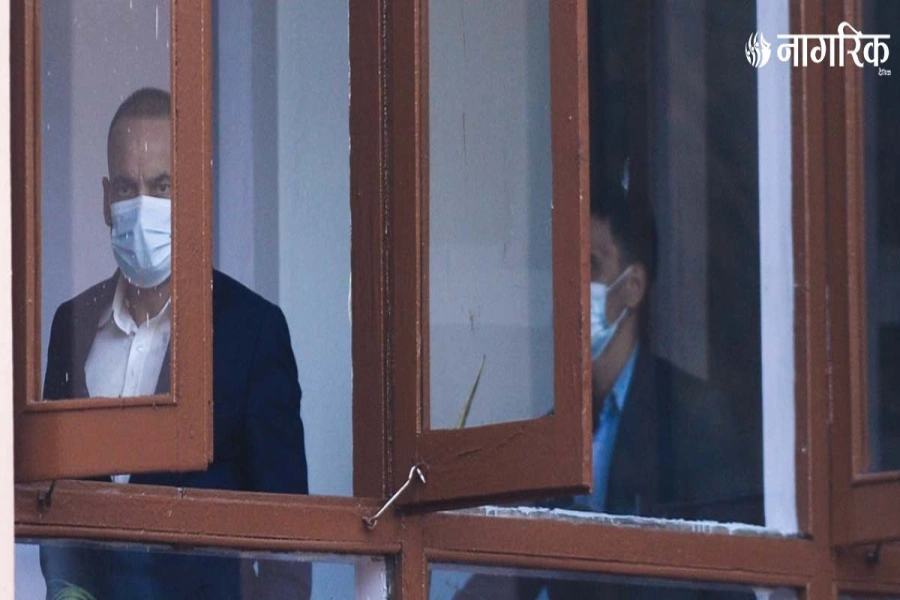Complex nexus of manpower agencies and feckless government bodies result in insurmountable suffering for victims
KATHMANDU, Jan 5: Amrita Dhakal, 32, of Saurapana, Gorkha could have been a successful entrepreneur today if only she had not dreamt of going to Japan and earning Rs 300,000 a month. Giving in to this lofty dream, she fell victim to a fraudster and she ended up selling off her clothing store, which was bringing her a steady income.
When she realized that she had been duped, she had no choice but to go to court in search of justice. The court gave a verdict in her favor on May 20, 2018. Showing a copy of the verdict, Dhakal said, “The court order stated that the fraudster named Govinda Prasad Tiwari was to be jailed for one-and-a-half years and would have to pay his victim a total of Rs 4.6 million. The irony is that justice has been done only on paper as police have yet to arrest him.”
This is just one case of how there exists a huge gap between court verdicts and their implementation, leaving victims of foreign employment scams like Dhakal in deep distress. Shockingly, 80 percent of such verdicts are never implemented and even in the remaining 20 percent, victims are hardly able to recover their money.
In Dhakal’s case, the court ordered Tiwari to pay her Rs 2.4 million. But as of now, she has not received a single penny. And she does not expect to see her money again. “But even if I don’t get my money back, I should have the satisfaction of seeing him behind bars,” she said.
Dhakal is not the only person to be scammed by Tiwari, who hails from Puranchaur- 3, Kaski, and his accomplice Prashant Bhattarai of Bardiya. Rabin Dahal from Kerabari and Devi Prasad Dhakal from Saurpani, both in Gorkha, have also been swindled by them. “I feel hopeless at times as the police are still looking for the culprits,” said Dhakal.
According to her, Tiwari keeps changing his identity while approaching people. When Dhakal met him for the first time he had introduced himself as one Dr Krish Tripathi. It was only later that she came to know his real name. Nepal Police issued an Interpol red corner notice against Tiwari on June 27, 2018 at the request of the Department of Foreign Employment (DoFE).
Tiwari has swindled many with promises of employment abroad that pays Rs 200,000 to 300,000 a month, said advocate Rajesh Bhandari. The victims realize that they have been cheated only after Tiwari vanishes with their money.
Nepali job seekers fall victim to deceptive Canadian employment...

People usually realize the fraud when there is no indication of their being sent abroad or when they have to turn back midway from the promised job destination.
They then approach the DoFE for redress. The DoFE scrutinized the case and forwards it to the Foreign Employment Tribunal.
Lots of times, the courts rule in favor of the victims but the compensations ordered rarely come through. According to an annual report of the Supreme Court from mid-July 2009 to mid-July 2018, a total of 1,304 cases of employment fraud were filed. Of these, 318 are still being looked into and the court has yet to recover Rs 96.8 million from the culprits in surety.
According to the Foreign Employment Tribunal Act, the victims themselves have to locate the addresses of the fraudsters and ascertain details of their property that can be attached. Such provisions get in the way of implementing the court verdicts.
Under Section 43 of the Foreign Employment Act 2064, an individual taking money to send someone for foreign employment but failing to deliver has to pay back the money taken along with a penalty that is 50% of the amount taken. The defaulter will also pay for the travel expenses incurred by the victim and could face a fine of Rs 300,000 to Rs 500,000, along with three to seven years in jail.
Greater chances of being duped by relatives
Many of those seeking foreign employment are swindled by their own relatives. Pabitra Rai, 39, had to lodge a case on behalf of her husband. Her sister-in-law Sita Rai and the latter’s husband Man Bahadur Pradhan had collected Rs 1.9 million from Pabitra’s husband Gajendra Rai and her brother Chandra Bahadur Bhujel. Gajendra was promised a job in Hong Kong. “They are cunning people and had already transferred the ownership of their immovable property to someone else,” said Pabitra in tears.
“We got into debt to pay them. How am I to pay back when I am busy fighting for justice,” she said. “They [creditors] have even threatened to commit suicide at my place. I don’t know what to do.”
Pabitra doesn’t have any property to fall back on. The whole mess has resulted in her husband’s illness. She still wants to send him to Dubai after this case is settled. “Our sister-in-law and brother-in-law said my husband would be working at a hotel in Hong Kong on a monthly salary of Rs 200,000 plus accommodation,” she said.
According to her, the court has told them to find the fraudsters themselves and locate their property. “The authorities say they can’t do anything if we can’t provide the property details,” she added. The law is an injustice to the victims, she said.
Mohan Kumar Shrestha, a 38-year-old from Bhagwati – 9, Kavrepalanchowk, is another victim of the legal provisions. He had gone to court and won a verdict. And he thought he would be duly informed about the verdict. But when he visited court again in Baisakh, 2076, he learnt that the verdict had already been issued four years earlier.
Shrestha had paid Rs 585,000 to one Tikamaya Magar, who had promised to get him recruited by an American company, Carnival Cruise. He was taken to Delhi on April 14, 2013. There were four other individuals also and they were all promised a monthly salary of 800 Euros. After two months in Delhi, they were taken to Indonesia. Shrestha finally realized that he had been duped when they were not allowed to go on to America. He returned to Nepal after much hassle and filed a compliant at DoFE.
A court issued a verdict in Shrestha’s favor. It said Magar would be jailed for one-and-a-half years and would have to pay the victim Rs 877,000. However, Shrestha does not have any contact information about Magar. He had been introduced to Magar by a neighbor.
Like Shrestha, Purna Bahadur Bhandari, 43, of Rajghat - 6, Morang also got to know about a court verdict in his favor four years after it was issued. The verdict was passed on April 21, 2015m but he had no clue regarding the whereabouts of the person who cheated him. Bhandari also had to turn back from Indonesia. He is preparing to file suit at Morang District Court.
Communication gap
The Foreign Employment Tribunal does not inform victims of its verdicts. This communication gap between the authorities and service seeks means delayed justice, said advocate Som Prasad Luitel, who has been working on foreign employment cases for a long time. He claims that unclear policies and laws have left victims high and dry.
“The victim is from Baitadi and the culprit from Taplejung but the case is lodged in Kathmandu. After the verdict the victim has to travel from Baitadi to the culprit’s district of Taplejung to find out if the latter has any property there and to legally stop the ownership of that property from being transferred,” Luitel informed. “Moreover, the victim has to approach the district court for the tribunal verdict to be implemented. The whole process is costly,” he adds.
According to former registrar at the tribunal Bhojraj Regmi, the district court is responsible for implementing the tribunal’s verdicts.
“The arraignment has to be prepared along with the recommendations of government lawyers regarding the punishment that needs to be meted out to the alleged fraudster and this needs to be registered at the tribunal,” he said. All the evidence needs to be verified and the defendant established as the fraudster. Then only does the tribunal decide, according to Regmi. “And it is only after this that the case goes to district court.”
Sanjiv Pokhrel, the officer at Kathmandu District Court who implements the verdicts, was surrounded by service seekers. “It is only if the culprit does not have any property that he or she will be imprisoned,” he said. Pokharel admitted that verdict implementation had become difficult as the victims fail to provide exact details of the fraudster’s property. The district court has to implement all kinds of verdicts and there is no record of verdicts related to foreign employment, he said.
Shocking numbers
The People Forum, in collaboration with the Foreign Employment Tribunal and Department of Foreign Employment, had conducted a study on the status of verdict implementation. According to the study conducted in eight district courts, around 96.77 percent of people who filed cases are not aware of legal aid and other legal information regarding foreign employment. Likewise, 83.87 percent of them are unaware of the verdicts issued, while 90.32 percent do not know how to file a case. Shockingly, 80 percent of verdicts are never implemented.
The study report has recommended that the DoFE itself should implement the verdicts rather than the district courts. Similarly, the report recommends that locating the fraudsters and their property needs to be the responsibility of the DoFE, and not the victims. The report points to a lack of coordination among the DoFE, the Foreign Employment Tribunal, district attorney offices, district courts, banks and others concerned.

Foreign Employment Tribunal
The tribunal is housed in a one-storey building at Babarmahal. There are a few chairs placed in front of the building and the victims can be seen waiting there with their documents to be invited inside to share their concerns. Every day, victims reach the tribunal with hopes of prompt justice. Decisions are taken at the tribunal three times a week, and it takes one-and-a-half years to two years to reach a decision in a given case.
(This news was prepared with support from investigative reporting fellowship of Media Foundation.)

















